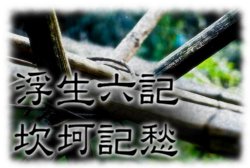Six Records of a Floating Life, 3: Kanke Jichou (Section 10)
 This is a sentence-by-sentence translation from the chapter 坎坷記愁 in Shen Fu’s 浮生六記 (Six Records of a Floating Life). It aims to be literal and close to the original text as far as possible, rather than be an idiomatic conversion to English.
This is a sentence-by-sentence translation from the chapter 坎坷記愁 in Shen Fu’s 浮生六記 (Six Records of a Floating Life). It aims to be literal and close to the original text as far as possible, rather than be an idiomatic conversion to English.
(See the index of Fu Sheng Liu Ji translations)
浮生六記 → 第六卷:坎坷記愁 → Section 10
華名大成,居無錫之東高山,面山而居,躬耕為業,人極樸誠,其妻夏氏,即芸之盟姊也。 Mr Hua’s personal name was Dacheng, and he lived at Dong Gao Mountain in Wuxi, living facing the mountains and farming the land for a living; as a man he was very simple and sincere. His wife was from the Xia family, and was Yun’s sworn sister.
_樸 means 'simple' in a good way, like 'uncomplicated'. 夏 is Mrs Hua's maiden name; note that traditionally in China, as in the West, women only ever have a man's surname - their father's or their husband's. 即 means 'namely', so literally this is "His wife, namely Yun's sworn sister, ..."_是日午未之交,始抵其家。 That day, only by late afternoon did we reach their house.
_未 is 'late afternoon', and this literally "at the crossing of afternoon to late afternoon". The function of 始 here is the same as 才._華夫人已倚門而待,率兩小女至舟,相見甚歡,扶芸登岸,款待慇懃。 Mrs Hua was already leaning on the door waiting; she led two small girls to the boat, and when we met we were very happy; Yun was supported on to the bank, and we were welcomed cordially.
_Although 相 could be a generic pronoun, here it is more likely to have the meaning of 互相._四鄰婦人孺子哄然入室,將芸環視,有相問訊者,有相憐惜者,交頭接耳,滿室啾啾。 The wives and the infants in the neighbourhood noisily entered the house, and stood around Yun looking at her; there were some who questioned Yun and some who took pity, and some who whispered in each other’s ears, filling the room with their chirping.
_四鄰 is like '四方鄰人', meaning 'neighbours from four directions'. 將 here is like the modern 把. 環視 is probably not the modern binome. Here 相 is a generic pronoun. 交頭接耳 is a four-character phrase meaning 'whisper in one another's ears'. 啾啾 is the noise of birds or insects (perhaps a reference to them speaking another dialect)._芸謂華夫人曰:「今日真如漁父入桃源矣。」 Yun said to Mrs Hua, “Today I really feel like the fisherman who entered the Peach Blossom Spring.”
_This is a reference to a famous [Chinese story about a fisherman who finds a mystical land](http://www.xys.org/forum/db/190/133.html "Translation of Tao Qian's "Peach Blossom Spring"") and is questioned enthusiastically by the natives._華曰:「妹莫笑,鄉人少所見多所怪耳。」 Mrs Hua said: “Sister, please do not laugh; that which country people see little of they consider most wonderful, that’s all.”
自此相安度歲。 Thus we settled down to pass New Year.
_度歲 is similar to 过年 - "pass the year" or "cross over the year"._至元宵,僅隔兩旬而芸漸能起步,是夜觀龍燈於打麥場中,神情態度漸可復元。 By Lantern Festival, only twenty days later, Yun gradually became able to rise and take steps; that night as we watched the dragon lanterns on the threshing floor, her spirits, emotion and bearing gradually recovered.
_隔 means 'separate', so this is literally "By Lantern Festival, only separated by twenty days". 神情 may be the modern binome 'expression', but is more likely part of the block 神情態度. Whilst Chinese often prefers groups of four, English often prefers groups of three, so this has been translated as "spirits, emotion and bearing". 元 indicates a return to a former state._余乃心安,與之私議曰: I then began to put my mind at rest, and because of this I privately discussed it, saying:
_The English here really isn't idiomatic, but seems the best way to remain close to the original, which is the aim of this translation._「我居此非計,欲他適而短於資,奈何?」 “Our living here was not planned; I wish to go somewhere else that is more suitable, but we are lacking in resources - what can be done?”
_奈何 is like '怎么办?' in modern Mandarin._芸曰:「妾亦籌之矣。 Yun said: “I have also been deliberating this.”
_籌 has the sense of 'preparing' or 'planning', and has been translated here as 'deliberating'._君姊丈范惠來,現於靖江鹽公堂司會計,十年前曾借君十金,適數不敷,妾典釵湊之,君憶之耶?」 Your older sister’s husband Fan Huilai is now an accountant at the Salt Office in Jingjiang; ten years ago he borrowed ten pieces of gold, but it happened that our figures would not cover it; I pawned my hairpins to put the amount together - do you remember this?”
_范惠來 is the name Fan Huilai. 金 is actually likely to be silver, not gold._Useful links
- The full Chinese text of 浮生六記 (Project Gutenberg)
- Six Records of a Floating Life (Penguin Classics) on Amazon (a much more idiomatic translation)
Series: Six Records of a Floating Life
- Six Records of a Floating Life, 3: Kanke Jichou (Section 1)
- Six Records of a Floating Life, 3: Kanke Jichou (Section 2)
- Six Records of a Floating Life, 3: Kanke Jichou (Section 3)
- Six Records of a Floating Life, 3: Kanke Jichou (Section 4)
- Six Records of a Floating Life, 3: Kanke Jichou (Section 5)
- Six Records of a Floating Life, 3: Kanke Jichou (Section 6)
- Six Records of a Floating Life, 3: Kanke Jichou (Section 7)
- Six Records of a Floating Life, 3: Kanke Jichou (Section 8)
- Six Records of a Floating Life, 3: Kanke Jichou (Section 9)
- Six Records of a Floating Life, 3: Kanke Jichou (Section 10) (this article)
- Six Records of a Floating Life, 3: Kanke Jichou (Section 11)
- Six Records of a Floating Life, 3: Kanke Jichou (Section 12)
- Six Records of a Floating Life, 3: Kanke Jichou (Section 13)
- Six Records of a Floating Life, 3: Kanke Jichou (Section 14)
